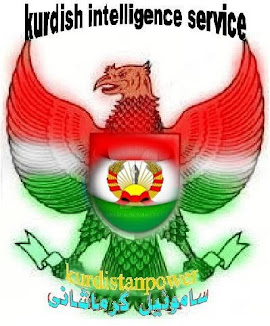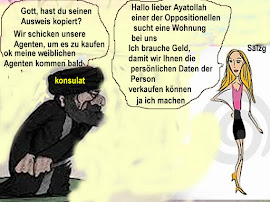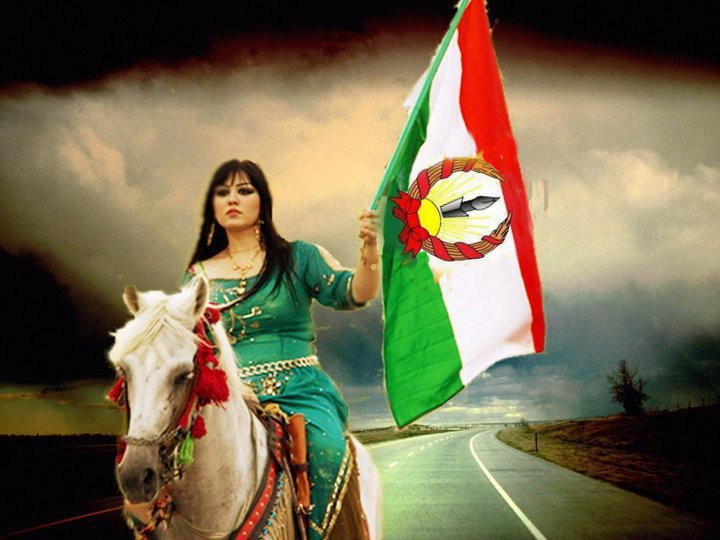skip to main |
skip to sidebar
Western Kurdistan female 'Lions' warriors terrorising IS: The real story of Narin Afrini
Western Kurdistan female 'Lions' warriors terrorising IS: The real story of Narin Afrini
Western Kurdistan womens Besieged since September 15, the Kurdish-majority city of Kobani in Syrian Kurdistan has mounted an all-out resistance to Isis (Islamic State) backed by state power and superior weaponry. This resistance, like our earlier struggle against Jabhat al-Nusra, has been empowered, if not led, by Kurdish female fighters.
Ever since Kurdistan was divided among Turkey, Syria, Iraq and Iran in the 1920s, self-defence against occupiers and aggressors has been a natural part of its people's daily lives. Throughout all those years, Kurdish female fighters have fought side-by-side with men.
During the 1925 Sheikh Said and 1938 Dersim resistance movements against the Turkish regime, for instance, women armed themselves and fought alongside men.
Telli Xanim, a guerilla and the wife of the Kurdish general Yado, a commander of the 1925 Sheikh Said resistance, is an idol of female Kurdish fighters today. Similarly, Zerîfe Xanim, the wife of Elîsêr, a Kurdish poet and politician who commanded the 1938 Dersim resistance, fought and died alongside her husband.
Among other leading symbols of Kurdish national female heroism are Margaret Shello, who at the age of 20 joined the ranks of the Peshmerga in their fight against the Iraqi Ba'ath regime, and Leyla Qasim, a Kurdish freedom fighter who was hanged by the Iraqi Ba'ath regime at age 22 while studying at Baghdad University.
The story of Narin Afrini
Today, due to the current escalation of the Isis attacks against the Kurds in Kobani, a new chapter of heroism is being written by Kurdish female fighters of the YPJ (Women's Protection Unit) which is affiliated with the People's Protection Unit (YPG), an armed group which is an official part of the autonomous administration of Syrian Kurdistan.
One of the most important figures of this resistance, and a subject of global curiosity, is the leader of the YPJ (Women's Protection Unit), Narin Afrini. Otherwise known as Maysa Abdo, she is the military commander of all YPJ female fighters in Kobani.
Kadar Sheikhmous, an independent Kurdish political consultant from the Kurdish region of Qamishli and co-founder of the Shar Development Organisation, told IBTimes UK: "Neither [Narin nor Maysa] is her real name, they are pseudonyms for the same person. And the photographs that are circulating of her are not her.
"She is a 40-year-old fighter who has been fighting for 20 years in the ranks of HPG/PKK [Kurdistan Workers' Party.] Before going to Kobani, she was fighting in Cezire, in the region of Qamishli, and she has been deployed in Kobani for a year and a half now.
"Ever since Isis started its attacks, the checkpoints of the YPJ [Women's Protection Unit] in Kobani have not withdrawn and have stayed in their positions. They have resisted many fierce attacks by Isis and shown competent armed force... many army brigades in both Syria and Iraq couldn't stand such attacks."
Lions with bullets in their pockets
Regarding the character of the female fighters, Sheikhmous says: "Most of these women were civilians before the outbreak of the war; some of them were university students. [Now] they always keep one bullet in their pockets so they don't get arrested by Isis."
Kenan Fani Dogan, a Kurdish political refugee, activist and blogger based in Stockholm, said that "the Kurdish society has always perceived female fighters as a symbol of bravery and valor.
"There is a common Kurdish saying about that: "Şêr şêre çi jine, çi mêre'', which means 'a lion is a lion – be it a female or male.' This mentality has developed even more today with Kurds who lean to and support the women's liberation and their right to have leading roles in all aspects of life.
"Both women politicians and fighters are hugely respected by the society. Kurds believe that women can take on all tasks including fighting and that the women's liberation and equal participation in social life will help liberate and develop the whole society.
"This is the same for female fighters in Kobani, as well. It is a great opportunity for Kurds that Kurdish women have skills more advanced than those of men, both in political administration and armed resistance. Kurdish female fighters have the support and admiration of all sections of the Kurdish society.
"I can even say that despite Kurds' political dividedness over many issues, their trust in and respect of their female fighters is the main subject that they entirely agree on. And I hope that female Kurdish fighters will set an example for all women to shatter the persecution imposed on them."
Kejê Bêmal, a Kurdish human rights activist and writer based in Antalya, told IB Times UK that "Contrary to what is believed, Kurds come from a matriarchal culture so female Kurdish fighters are not a new phenomenon in the Kurdish history. As a natural outcome of living in an occupied land, Kurds - with their children, men and women - have a fighting spirit in a defensive manner.
"Kurdish women have never left the men alone in their fights. The primary reason for that is that during wars, women are seen as spoils of war. So Kurdish women have tried to defeat that ill fate and defend themselves by fighting alongside men."
Women are the equals of men - and they can drag us forward
Hatice Cevik, an administrator of the Ankara branch of the pro-Kurdish Peace and Democracy Party (BDP) and an activist of the Democratic and Free Women Movement which is affiliated with the BDP, told IBTimes UK that gender equality is one of the most important principles of their party.
"Women are leading figures in our political movement. Our stance is that men and women are completely equal," she said.
"We have the biggest respect for the YPJ [Women's Protection Unit] because to us, the revolution in Rojava Kurdistan [Syrian Kurdistan] is a female revolution. All of the values we have embraced so far are realized in Rojava Kurdistan.
"Not all women fighting in Rojava Kurdistan right now were fighters before the war got started. They were women working or studying. Some of them were housewives. But now all of them have joined the YPJ forces and are resisting Isis. This resistance is our honour. Women in Kobani are fighting for their freedom and Kurdish men are also proud of that."
Kemal Bulbul, the head of the Pir Sultan Abdal Alevi Cultural Association, and a columnist of the pro-Kurdish Ozgur Gundem newspaper in Turkey, said that the female fighters in Syrian Kurdistan have the potential to lead the way for a new women's liberation movement in the Middle East.
"I believe that what Kurdish female fighters have been doing in Kobani will create a new women's enlightenment for the whole region. In many countries in the Middle East, women are severely persecuted.
"When ISIS took over Mosul, it proclaimed that women should only go outside if absolutely necessary. In such a region, Kurdish female fighters and politicians have become the leading figures of their society. And that is a female renaissance, a female revolution in the Middle East."
There are still some countries which discuss whether women may drive cars or vote. The struggle of Kurdish women in Kobani can shake the system of such backward countries. And this is one of the reasons why Isis, the AKP government and Arab states oppose the self-rule of Kurds in Syrian Kurdistan."
By Uzay Bulut in Ankara, IBT
news agency, ibtimes.co.uk



















.jpg)








































Inga kommentarer:
Skicka en kommentar